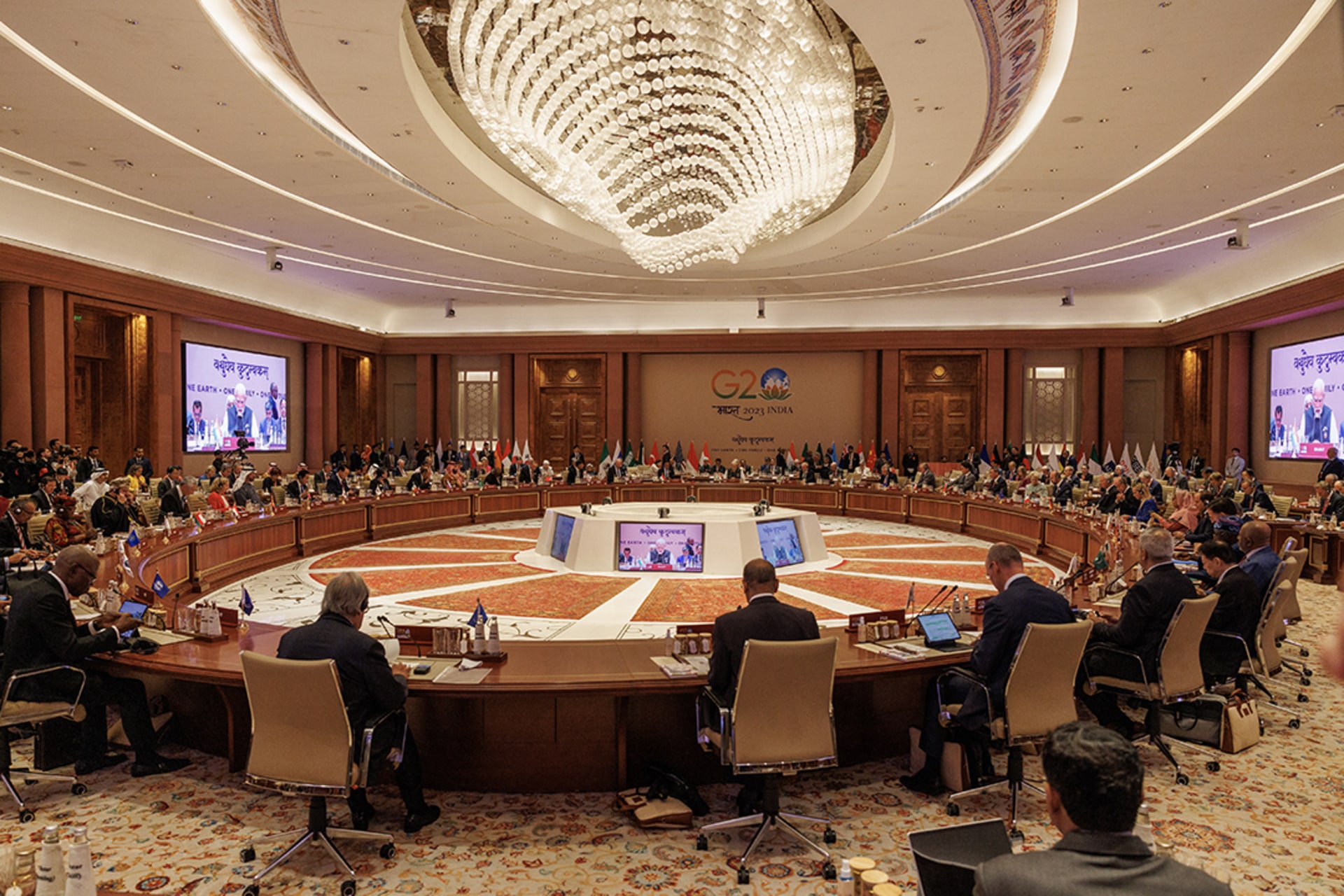U.S. Security Agreements and Iraq
Published
Updated
Iraqi lawmakers approved new ground rules for the U.S. troop presence, including a U.S. withdrawal by 2011. But questions about the accords’ legal longevity remain.
This publication is now archived.
Introduction
As the United States prepared for a presidential transition, the Bush administration put the final touches on long-term agreements with Iraq’s government intended to shape legal, economic, cultural, and security relations between the two countries well into President-elect Barack Obama’s first term. U.S. and coalition forces have been in Iraq since 2003. And while the UN Security Council did not explicitly authorize the invasion, the council did approve the presence of foreign forces in an annually renewed resolution first adopted in October 2003. Because Iraq’s government has requested that the Security Council not renew the mandate upon its expiration at the end of 2008, U.S. officials have had to accelerate negotiations on a detailed legal framework for the U.S. presence in Iraq. Two major agreements-a Status of Forces Agreement stalled on the issue of legal immunity for U.S. troops and dates for a full withdrawal, and a broader strategic framework agreement-were approved by Iraq’s parliament in late November 2008.
Agreements Take Shape
Details of the draft agreements began to leak in early 2008, when U.S. Ambassador to Iraq Ryan C. Crocker, testifying before Congress, confirmed two separate accords were on the table. The first, a status of forces agreement, called a SOFA, would codify legal protections for U.S. military personnel and property in Iraq. Such agreements already govern U.S. military conduct in other long-term deployment zones--including Germany, Japan, and South Korea--and the administration has characterized talks for a SOFA in Iraq as a hopeful step toward stability. The final version shows significant concessions from the U.S. side. For instance, the Bush administration agreed to a total withdrawal of U.S. troops from Iraq by the end of 2011. The draft and final versions also called for additional restrictions on how U.S. troops conducted missions, and required a pullout from Iraqi urban areas by July 2009.
 The second accord, referred to as a “strategic framework agreement,” was broadly aimed at addressing issues not covered by the SOFA, including those outlined in a “declaration of principles” document signed by President Bush and Prime Minister Nouri al-Maliki in November 2007. Among these issues: the U.S. role in defending Iraq from internal and external threats; U.S. support of political reconciliation; and U.S. efforts to confront terrorist groups. But the final version of the strategic framework focuses primarily on shaping future cooperation on cultural, energy, economic, environmental, and other issues of mutual interest.
The second accord, referred to as a “strategic framework agreement,” was broadly aimed at addressing issues not covered by the SOFA, including those outlined in a “declaration of principles” document signed by President Bush and Prime Minister Nouri al-Maliki in November 2007. Among these issues: the U.S. role in defending Iraq from internal and external threats; U.S. support of political reconciliation; and U.S. efforts to confront terrorist groups. But the final version of the strategic framework focuses primarily on shaping future cooperation on cultural, energy, economic, environmental, and other issues of mutual interest.
Critics of both measures contend the Bush administration aims to tie the hands of the next president and usurp Iraqi sovereignty, charges the White House vehemently disputes.
The Law of the Flag
Historically, the status of forces agreement is a legal framework that defines how foreign militaries operate in a host country. Typically established by executive agreement, there is no uniform or standard format for the document, which can vary in length and specificity. The SOFA drafted in 2002 between the United States and East Timor, for instance, was less than three pages long. The 1966 SOFA with South Korea, by contrast, tops 150 pages and includes over thirty annexes. But while most SOFAs are publicly available, others remain classified; U.S. officials themselves disagree on how many are in effect. During congressional testimony in April 2008, Crocker testified that the United States has approximately eighty SOFAs worldwide. A February 2008 Washington Post op-ed coauthored by Secretary of State Condoleezza Rice and Secretary of Defense Robert M. Gates, however, put the number at “more than 115.”
Some members of Congress say the Bush administration will need to send the Iraq SOFA to Congress for ratification, a position President-elect Obama argued during his presidential campaign. White House officials, meanwhile, have resisted. Michael J. Matheson, a professor of law at George Washington University, told lawmakers in February 2008 that if a SOFA is “limited to giving U.S. forces and personnel exemption from foreign law, the president may conclude it without further congressional approval.” But Yale Law School professors Bruce Ackerman and Oona Hathaway argue the agreement being negotiated “moves far beyond” traditional accords--such as proposed exemptions for civilian contractors--and should therefore be subject to congressional review (WashPost).
Legal Framework
Status of forces agreements are used to define the rights and obligations of militaries operating on foreign soil, detailing everything from how soldiers wear their uniforms and carry weapons to how their mail is delivered. But the most common issue addressed is the legal jurisdiction over foreign forces (PDF), says R. Chuck Mason, a legislative attorney for the Congressional Research Service. Legal protection is of particular importance to the U.S. military. According to a November 2003 Department of Defense directive spelling out the Pentagon’s status of forces policy (PDF), the United States enters SOFAs to protect “personnel who may be subject to criminal trial by foreign courts and imprisonment in foreign prisons.”
Yet the granting of immunity to military personnel has become a source of friction for host countries where SOFAs are enforced. The agreement with East Timor, for example, brought a wave of criticism from the local press. Allegations concerning off-duty misconduct by U.S. soldiers on the Japanese island of Okinawa have also highlighted “the importance of providing safeguards both to American forces stationed abroad and to the civilian populations with whom they come in contact,” said Ruth Wedgwood, an expert in international law at John Hopkins University, in February 2008 testimony to a House subcommittee.
A SOFA in Iraq
Negotiations for a status of forces agreement with Iraq were initiated to replace the UN mandate authorizing foreign forces set to expire at the end of 2008. Several months after the U.S.-led toppling of Saddam Hussein’s government in 2003, the UN Security Council passed Resolution 1511, officially recognizing the Coalition Provisional Authority (CPA) and authorizing a multinational force to bring stability to the country. But included in the resolution was the requirement that the security mandate be reviewed one year from implementation. Every year since, the United Nations has extended the mandate at the request of the Iraqi government. But in late 2007, Maliki asked the Security Council to extend the mandate “for the last time.” Expiration of the mandate also will officially end Iraq’s designation as a threat to international peace and security--a UN distinction that dates to 1990.
The United States enters SOFAs to protect “personnel who may be subject to criminal trial by foreign courts and imprisonment in foreign prisons.” --2003 Pentagon policy memorandum
Currently, multinational forces, international consultants, and U.S. personnel are immune from the Iraqi legal process (PDF). CPA Order 17, which granted the immunity, was not amended or rescinded by the Iraqi government after the provisional authority was dissolved. Jennifer K. Elsea, a legislative attorney with the Congressional Research Service, told lawmakers in February 2008 that the order means U.S. forces might not necessarily be forced to leave when the UN mandate expires. But the Bush administration took no chances. In November 2007, President Bush and Maliki signed an agreement spelling out the political, economic, and security issues meant to frame relations between the countries. Left out of the new security agreements, however, are legal protections for nonmilitary personnel. Doug Brooks, president of the International Peace Operations Association, a trade group representing security contractors, says this oversight could lead some Western contractors to conclude that doing business in Iraq is too risky. “As one of our contractors put it, during the kinetic part of the war we had all sorts of protections. Now that we’re in the reconstruction phase, we don’t have any.”
A Contentious Accord
Opposition leaders in Iraq and legal scholars in the United States have been critical of the way Washington has characterized the SOFA, and some Iraqi hard-liners kept up their opposition following parliamentary voting in November 2008. Anti-American cleric Muqtada al-Sadr, who called on Shiite followers to protest the agreement, denounced the cabinet’s approval and urged supporters to take up arms against Americans. But other opponents of the pact appear to have softened their position. Maliki succeeded in building support for the pact among Shiite and Kurdish leaders. Shiite cleric Grand Ayatollah Ali al-Sistani, who objected to previous versions of the accord, did not publicly oppose the version passed by the cabinet.
Questions about what the U.S. side has given up could linger. Yale’s Hathaway says the SOFA, as discussed publicly, appears to go beyond agreements negotiated with past allies. “The SOFA is a misnomer here; it’s a SOFA-plus. And it’s the ’plus’ that’s controversial.” Hathaway says a so-called right-to-fight clause--the legal authority to conduct military missions after the UN mandate expires--is the “linchpin” of the debate. Other experts say the provision requiring U.S. troops to leave Iraqi cities by the summer of 2009 could render them powerless in containing future violence. Among the most discussed changes outlined by the security deal--in addition to withdrawal from cities by mid-2009 and total withdrawal by the end of 2011--are requirements that U.S. combat troops coordinate missions with the Iraqi government; hand over prisoners to Iraqi authorities; relinquish control of the Green Zone; and give Iraqi authorities the lead in monitoring Iraqi airspace. The agreement also allows for nonmilitary contractors to be subject to Iraqi law, a change contracting advocates fear will open civilians up to unfair prosecution.
U.S. officials, meanwhile, have repeatedly stated that neither agreement will tie the hands of the next administration. The agreements “will not establish permanent bases in Iraq, nor will they specify in any fashion the number of American forces to be stationed there,” Ambassador David Satterfield, a senior adviser on Iraq policy, told lawmakers in March 2008.
Strategic Framework Agreement
In addition to the SOFA, the Bush administration negotiated a so-called strategic framework agreement with Baghdad, defining relations on economy, culture, science, technology, health and trade. Experts questioned the secretive way this agreement was hashed out by Iraqi and U.S. officials, and disagreed on what the final accord would contain. But administration officials maintained the framework would broadly address issues outlined in the November 2007 agreement between Bush and Maliki. Political and economic items make up the bulk of the strategic framework, including vows to promote regional peace; encourage cultural, education, and scientific exchanges; and promote greater direct foreign investment. Wedgwood, of Johns Hopkins University, says the Iraq framework appears to be a reiteration of the framework the United States signed with Afghanistan in 2005. Among the most contentious issues on the Iraq strategic framework was whether its principles would be binding, or if it would indefinitely commit Washington to defending Iraqi sovereignty. But on that front Wedgwood sees a clear line. “I do not believe that in the strategic framework there will be a legally binding promise to come to the aid of Iraq,” she said in an interview with CFR.org.t
Colophon
Staff Writers
- Greg Bruno





